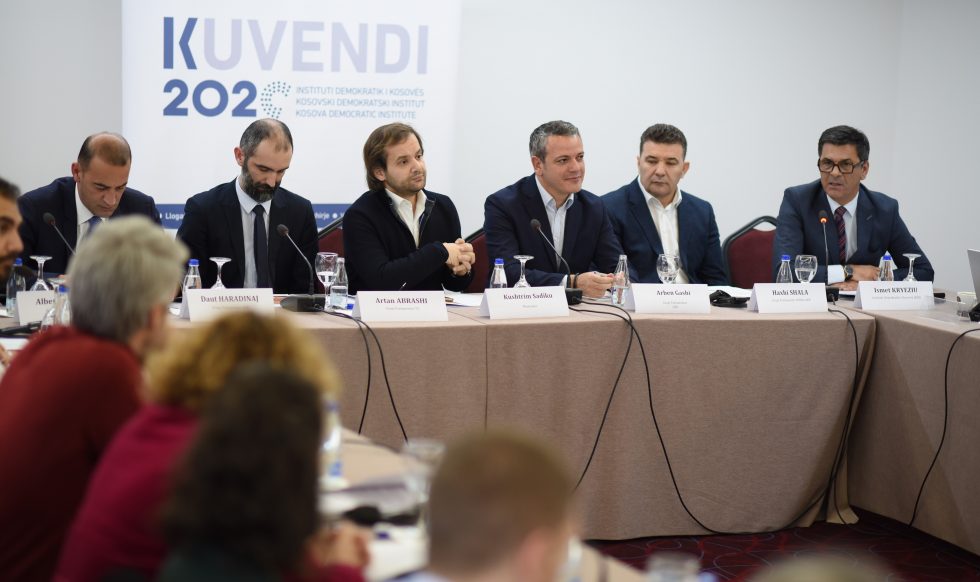


The Kosova Democratic Institute (KDI) held a roundtable discussion on “Kosovo-Serbia Dialogue: What after the formation of the new Government and the US involvement?”, a discussion between representatives of parliamentary parties, civil society and the media.
At the opening of the roundtable, Ismet Kryeziu, Executive Director of KDI, emphasized that KDI has been providing assistance to the Assembly of Kosovo for four years now, aiming to strengthen its oversight role in the Kosovo-Serbia dialogue process to ensure transparency, accountability and civic participation in the process. Mr Kryeziu added that, with the direct involvement of the US, the dialogue process has taken on a new dynamic, while the new Government’s stance on imposing reciprocity measures on Serbia and lifting the 100% tariff remains to be clarified.
Artan Abrashi from Lëvizja Vetëvendosje stated that the position and the opposition should be unique in terms of dialogue which is about to start very soon. He emphasized that this is a challenging process which must be based on three principles, namely that there can be no agreement without dialogue, there can be no dialogue with maps, and the process should not be limited to two individuals, be they presidents or prime ministers of both countries. “The tariff will be lifted when the conditions for reciprocity with Serbia are created. Reciprocity will be established after conducting the analysis and scanning of the situation within different sectors that will be affected by reciprocity”, he said. Mr Abrashi added that the tariff has lost its effect and is not bringing the desired effects.
Arben Gashi, head of the parliamentary group of LDK, assessed that the tariff was used as a political tool by the previous government and brought political damage to Kosovo in relation to the international community. He said the Government is considering lifting the tariff and establishing reciprocity while not hampering again the talks mediated by the international community, especially by the US. “In all the relations where Serbia does not recognize Kosovo, Kosovo will not recognize Serbia”, he said. In concrete terms, according to him, the reciprocity will be implemented, inter alia, in connection with the international trade code, food safety/phytosanitary certificates, transport vehicles and education. Whereas, regarding the political reciprocity in relation to the lobbying of Serbia, he spoke about the full guarantees of the international community for stopping this campaign of Serbia, without excluding other analogous actions that can be taken.
The head of the parliamentary group of AAK, Daut Haradinaj, stated that the opposition will be constructive and a guardian of Kosovo that was declared independent on 17 February 2008. Mr Haradinaj spoke against lifting the tariff without first having Kosovo recognized by Serbia. According to him, the tariff has prevented Serbia’s territorial claims on Kosovo. On the other hand, he added that “Until there is no mutual recognition, there can be no functional reciprocity”. Mr Haradinaj added that the tariff has not stalled the dialogue, as the same is on-going and agreements have been reached on the motorway, railways and airlines between the two countries.
Haxhi Shala, head of the parliamentary group of NISMA-AKR, said they continue to hold the same stance on the tariff. He added that it is unclear what the ruling coalition will do regarding the talks, as well as what is meant by reciprocity. “According to the ambassadors’ statements, the reciprocity, just like the tariff, will block the process. If from an international boycott due to the tariff we are going to a second boycott because of the reciprocity, then why do we have to lift the tariff?”, he stated. Concerning the stance on the dialogue, Mr Shala added that they will be constructive and once there is a clear platform on what the negotiating team will do they will state whether they support this process or not.
Participants in this roundtable called for creative solutions for the implementation of the tariff and reciprocity, continuation of the dialogue, implementation of the agreements already reached, and also discussed the economic effects of the tariff, especially in the northern part of the country.
See the full video of the roundtable here.
This discussion was organized in the framework of the project “European perspective – building national consensus on normalizing relations with Serbia” supported by the Swiss Embassy in Prishtina.